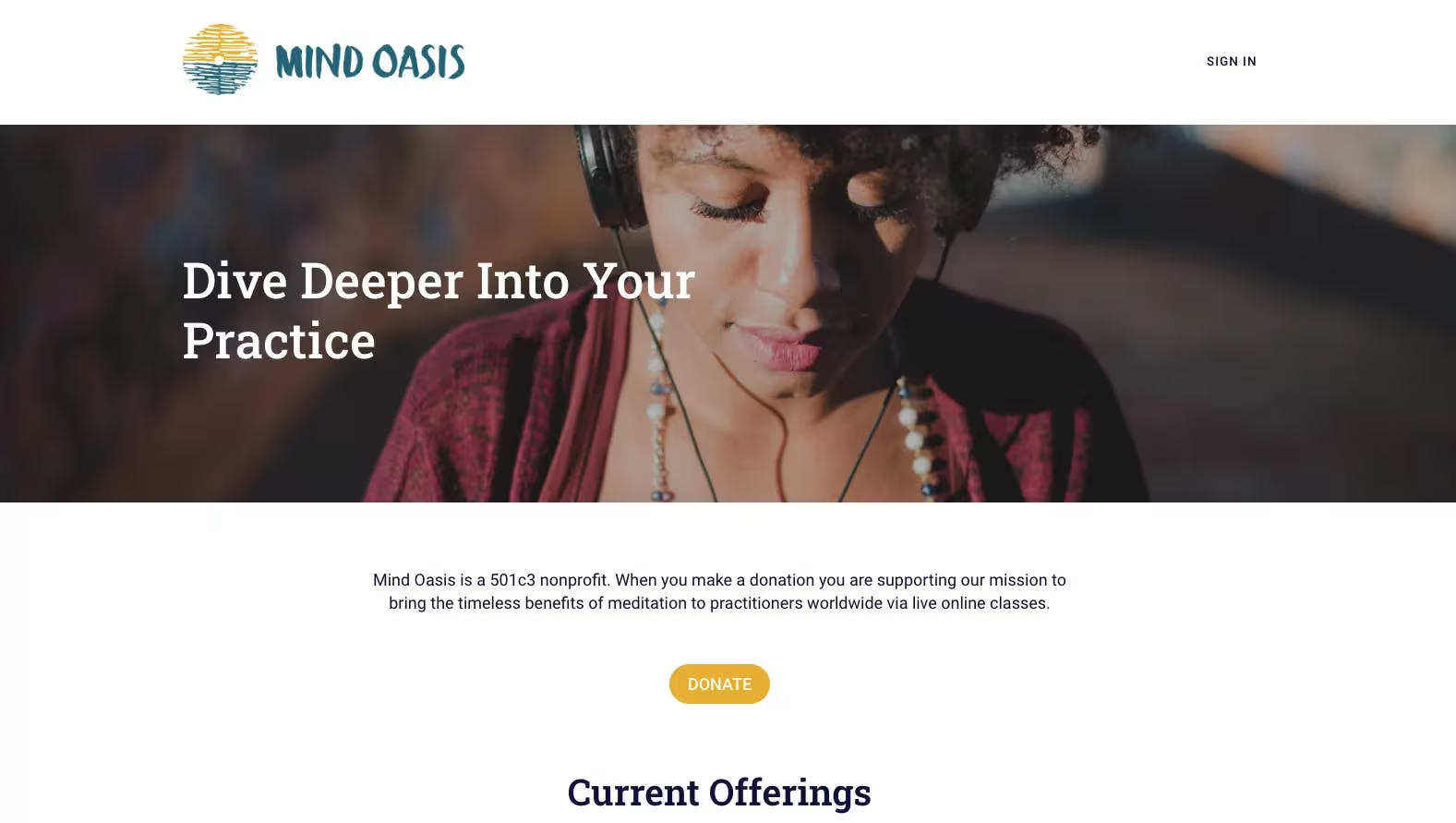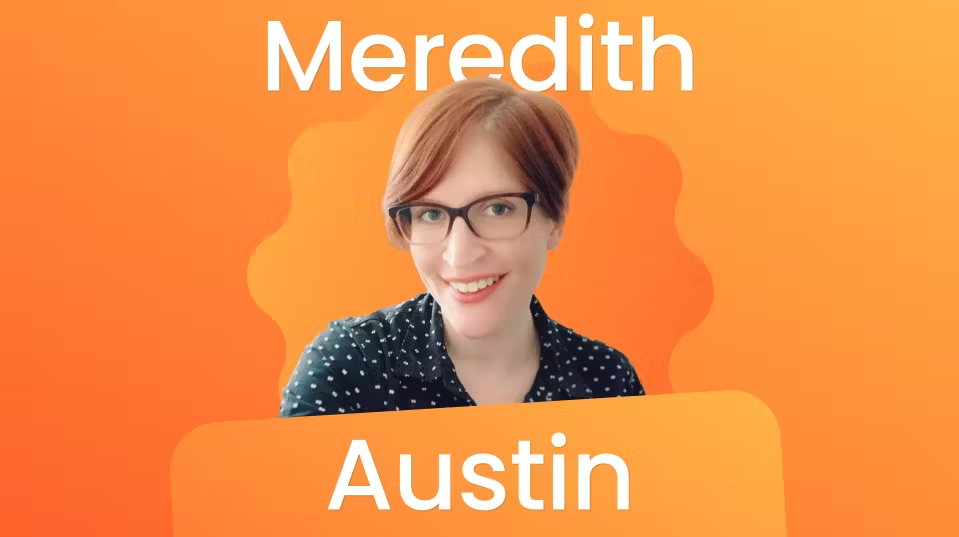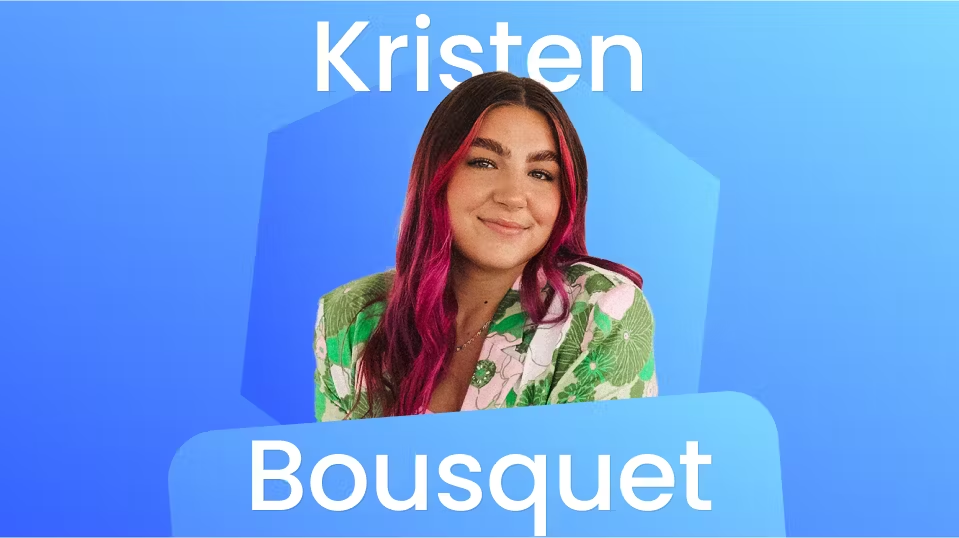How Mind Oasis is Connecting 3,000+ Students to Online Meditation

Five years ago, Karuna Schwartz found herself on a month-long meditation retreat in the middle of the Arizona desert. She had only recently been introduced to the world of meditation by her yoga class teacher — yet she knew the practice had the power to unlock something transformational in her life, both personally and professionally.
“Even though I wasn’t that familiar with meditation at the time, I realized that it was already changing things in my life. I’m a go-getter and a type-A personality, and before discovering this practice, I didn’t have the tools that I could use to go out in the world and be a helper instead of a hurter,” she says.
After three weeks of soul-searching on the retreat, the idea of Mind Oasis came to Karuna. The whole concept felt beyond her — all she knew is that she wanted to start a non-profit that connected students with expert meditation teachers online, regardless of where they were in the world.

“It’s important to remember that in 2017, the online course phenomenon wasn’t as popular as it is now. So I left that retreat, I came home, and I went to my mentors and said, ‘I have this idea of bringing meditation alive online.’ They all rooted for me even though I inwardly thought I would fail. Nevertheless, Mind Oasis was born.”
Since 2017, Karuna has grown the global Mind Oasis community to over 3,000 members and has expanded her non-profit budget from $48,000 to just under $200,000. Here’s how she did it:
She identified her ‘special sauce’ in the world of meditation
From day one, Mind Oasis’ mission has been to bring the timeless benefits of mindfulness and meditation to people worldwide. Within this mission, Karuna has been determined to emphasize the differences between guided meditation and teaching meditation as a holistic practice.
Karuna launched Mind Oasis as an online educational platform — she offered courses on yoga nidra, Buddhism and Hinduism. While this educational focus proved to be a beneficial venture, Karuna’s heart was in the more practical and tangible side of meditation.
She eventually discovered that her ‘special sauce’ was offering live online group meditation courses — a venture she later dubbed ‘Community Meditation’.
“Community Meditation is the foundation of what we do at Mind Oasis. We meet every day — it’s live, and it’s interactive. The live component will forever be our special sauce because we believe that connection and community is so important, especially in this day and age. And we want the education component to be the connector.”
She established her business model right off the bat
As a result of her 20-plus years of experience in nonprofit management, Karuna decided that Mind Oasis’ values best aligned with a not-for-profit business model.
“It actually turns my stomach to think of meditation being a for-profit practice. Meditation is all about being connected with the present moment and to profit off that doesn’t feel great to me. It doesn’t mean that we don’t pay our teachers well — it doesn’t mean that I don’t earn a little bit of money,” she explains.
“I’m not saying that people shouldn’t earn money in a relationship to meditation and mindfulness, but the cool thing about nonprofits is that as you grow and as you make profit, instead of answering to shareholders, you’re answering to the mission and the community itself.”
Despite her core conviction, Karuna is transparent about the difficulties she has experienced as a result of her nonprofit approach.
“There have been times when I’ve questioned my decision. Finding foundation support has been very difficult because Mind Oasis occupies a very unique space — we’re not arts and culture, we’re not animal support. So we’ve not been able to rely on that type of funding as a revenue stream which has been very challenging,” she explains.
However, on the flip side, a nonprofit business model enables Karuna to go above and beyond when offering her students financial support.
“When a student comes to me and says, ‘I need a scholarship’, we can do that because that’s within our scope. Regardless of pay, our business model gives other people the opportunity who have a little extra to share and help contribute to those who have a little bit less. To me, that creates a really beautiful foundation.”
She allowed her organic core offering to naturally cultivate community
Due to her non-traditional business model, Karuna faces a different set of challenges when it comes to conversions. She has veered away from traditional, for-profit marketing methods that don’t align with her values — instead, she has allowed Mind Oasis’ core product offering to build a loyal audience base.
“When it comes to establishing sales funnels, we’re not experts. We only claim to be experts in the area of meditation — but conversions are hard. “What has worked for us is organic growth — quality over quantity. We’re first to admit that we’re babies compared to the big guys out there, but I can confidently say that it’s our really awesome product that makes us unique.”
Karuna has been intentional about encouraging her loyal students to be her biggest sounding boards. This form of word-of-mouth marketing is what has breathed life into Mind Oasis.
“To be perfectly honest with you, I know that there are influencers out there who get paid to bring in thousands of customers. But my experience is that’s not what has worked for us. It’s simply having loyal students who have had a magical experience in a group meditation.”
Even with this system in place, Karuna says the million dollar question will always be, ‘How do we get people through the door?’
“It’s challenging because there is a lot of competing noise out there. So we have resorted to some more traditional methods like Facebook advertising, five-day meditation challenges, free trial courses — we’ve kind of tried it all. But at the end of the day, if you have really great product and you have people who love you, they’re gonna tell their friends about it. It’s not gonna be the fastest way, but we’re mighty, we’re strong, and we’re still here.”
She formed promotional and curriculum partnerships with her teachers
Ever since Mind Oasis’ early days, Karuna has been intentional about paying her teachers well to leverage their full potential. Over 70% of her earnings go to her instructors — because of this, she asks them to partner with her both in a promotional and curriculum capacity.
“The partnerships we do with our teachers really help us get our attendance numbers up and fill those seats. When it comes to forming the curriculum, we are intentional about strategizing with our teachers through companion courses where they can send an RFP (request for proposal) — this provides the structure to the majority of our courses.”
Through these RFPs, Karuna’s instructors will propose various 4-week and 6-week meditation series that she is able to contribute to.
“The thing we’ve done well is we’re able to help guide our teachers into a good course offering that will be well received by our audience. They send me the proposal, they send me their picture, I put up the course, and then we co-promote,” she explains.
“It’s a win-win situation because we’re not having to beat down the door and put together all of those elements on their own. And for our instructors, they just want to teach — this system allows them to do just that.”
She offered a tiered-pricing structure based on her community’s individual needs
When it came to building her pricing model, Karuna was determined to make accessibility the foundation. Her initial structure was based off what yoga studios were charging — she took the price of a weekend workshop and divided it by the hour to get a fair rate.
Most importantly, however, Karuna has offered tiered pricing from day one which has unlocked new levels of meaningful growth.
“We offer three rates — we have a community rate, a supporting rate, and a sustaining rate. The community rate is a scholarship rate. It’s not necessarily what the teacher’s fair market value is, yet we offer it to students who may not be able to afford it otherwise. The sustaining rate is the fair market value, so that’s what our students would pay if they went anywhere. And then the supporting rate is an opportunity to give a little bit more if you have the capacity to do so,” she explains.
“Over time, we found that our pricing structure averages out to the fair market rate, while simultaneously allowing anyone to become part of the Mind Oasis community.”
In 2019, Karuna decided to raise her rates by $5 to test the market and see if she could still get people to sign up and register — even after this increase, her students numbers didn’t diminish.
“I think this test was successful because of our tiered structure. Ever since that rise, we’ve kept our rates there. However, what we’ve found over the past six months or so, is that people are concerned about the economy, and their dollars aren’t going quite as far,” she says.
“We’ve had to suffer a bit on our profit margins, but we’re confident that we’ll make up for it down the road by continuing to welcome more people in.”
She utilized Thinkific to its fullest potential
Ever since Karuna discovered Thinkific in 2019, Mind Oasis has reached new heights both as a teaching platform and community. Karuna has offered hundreds of courses through Thinkific, and in her words, it has acted as the glue that has brought all of Mind Oasis’ moving parts together.
“Thinkific has done a really exceptional job at letting us have a hub that features our live classes, recordings, discussion groups, and PDFs. The whole process of using Thinkific has been completely seamless, whether we’re hosting workshops or an immersive meditation series.”
As a non-profit, Karuna says Thinkific has gone above and beyond in supporting her as a course creator.
“Thinkific has fully recognized us as a nonprofit and has been receptive to when we’ve gone through tough times — there’s been a real sense of personalization within the support. It feels as though Thinkific it is more than just a big company, I will always feel like the platform cares about our success and well-being. I’m really grateful for everything that Thinkific has allowed Mind Oasis to do — we would not be in the position we are today without them as a partner.”
She used failure and disappointment to lay the groundwork for future success
Looking back on her course creation journey thus far, Karuna is very open about the fact that she had no idea what her end goal was when she first launched Mind Oasis. However, taking the initial leap of faith has brought about invaluable learning opportunities that she wouldn’t have had otherwise.
“In the early days, I remember just throwing ideas out there and seeing if they would land. There’s been countless occasions of trial and error — there’s been huge triumphs, as well as huge failures. I have lost more friends in the past five years than ever before, but I’ve also gained more friends than I ever thought possible,” she says.
Through her experience, Karuna recognizes how easy it can be to give into comparison and imposter syndrome, especially when first starting out.
“Sometimes I would feel this huge expectation that Mind Oasis somehow should be bringing in more people. For anyone who’s reading this as a course creator, they know how hard it can be, especially because there’s so much noise out there,” she says.
“It all comes down to stick-with-it-ness. Maybe you’ll have 100,000 people join right off the bat, but that has not been my experience. I’ve come to understand and appreciate that slow and steady growth are just as valuable.”
Inspired by Karuna’s story about building a thriving online course business? Ready to take the leap yourself? Start your Thinkific free trial today!
See related Case Studies
-

How Academity’s 12,000-Strong Community is Broadening the Definition of Gifted Education
Read more: How Academity’s 12,000-Strong Community is Broadening the Definition of Gifted EducationLearn how Texas teacher Meredith Austin developed an online education program empowering teachers nationwide.
-

How Storytelling Collective is Helping 12,000 RPG-Writers Unlock Their Creative Process
Read more: How Storytelling Collective is Helping 12,000 RPG-Writers Unlock Their Creative ProcessAshley Warren fell in love with stories when she was a little girl. Whether she was submitting fictional tales to her local library competition or
-

How Kristen Bousquet Helps Her (150+) Members Monetize
Read more: How Kristen Bousquet Helps Her (150+) Members MonetizeFind out how Kristen Bousquet earns more than $4,000 USD in monthly recurring revenue thanks to courses and memberships.
